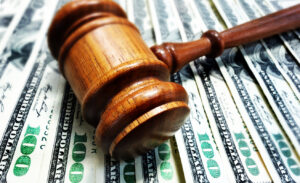Economic Damages
 After an accident in Kentucky, injury victims bring personal injury claims to seek compensation. This compensation, generally speaking, is referred to as “damages.”
After an accident in Kentucky, injury victims bring personal injury claims to seek compensation. This compensation, generally speaking, is referred to as “damages.”
Damages after a personal injury accident in Kentucky will likely consist of economic and non-economic damages for financial and emotional harm. Understanding economic damages can help you be prepared to seek the total compensation you’re entitled to in a personal injury case.
Elements of a Negligence Claim
Negligence is the foundation of most personal injury claims. Negligence refers to the failure to act with the care expected of a reasonable person. When someone’s negligence leads to harm, it may lead to a personal injury claim.
To establish negligence, four key elements must be present:
- Duty of Care: The responsible party owed a duty of care to the injured party.
- Breach of Duty: The responsible party failed to fulfill their duty of care.
- Causation: The breach of duty directly caused the injury.
- Damages: The injured party suffered actual harm or damages.
To successfully bring a negligence claim and recover economic damages, the plaintiff must prove that all four elements have been met.
Types of Damages
Damages in a personal injury claim can be categorized into two main types: economic and non-economic.
Economic Damages
Economic damages compensate for the harms from an accident that are easily measured. In economic damages, various losses may be eligible for compensation, including:
- Medical bills
- Property damage
- Lost wages
- Loss of earning capacity all falls under economic damages.
Non-Economic Damages
Non-economic damages compensate for the intangible, emotional distress from an accident. These damages typically address:
- Pain and suffering
- Loss of enjoyment of life
- And the loss of consortium.
Medical Expenses
Plaintiffs can claim coverage for all medical costs related to the injury, including:
- Hospital bills
- Surgeries
- Medications
- And ongoing treatments and rehabilitation.
- Future and current medical expenses.
Property Damage
Injury victims can claim the costs of reimbursement or repair for any property damaged in the accident, such as vehicles or personal belongings. If the repair cost is lower and feasible, courts may decline to reimburse the entire cost of the damaged item.
Lost Wages
Injury victims can be compensated for income lost due to the inability to work during recovery. Proof of lost wages may be shown through pay stubs, tax returns, or records of time off from work.
A personal injury attorney can help you gather and analyze the evidence needed to prove lost wages.
Loss of Earning Capacity
An injury may limit one’s ability to perform specific tasks, reducing the kinds of work they can take on. This may result in a loss of earning capacity.
It is essential to try to estimate your damages accurately, as one cannot go back and ask for additional compensation after accepting a settlement offer.
How Do Courts Determine the Value of Your Claim for Economic Damages?
The calculation of economic damages involves a meticulous assessment of various factors, including:
- The severity of the injury
- Medical costs arising from the injury
- The value of the property damaged in the accident
- Lost wages during recovery
- Loss of earning capacity due to the injury
You should consult with a lawyer to determine what additional factors may be applicable to your case.
How Can I Prove Economic Damages?
Proving economic damages requires thorough documentation and evidence. To strengthen your case, consider the following steps:
Document the Scene
Photos and witness statements not only prove the injuries sustained and property damage, but they can also help establish liability. It can also determine your success on the other elements of your negligence claim. If you do not prove all four elements of negligence are met, your claim may be dismissed.
Keep Detailed Records
Maintain meticulous medical records, including expenses, prescriptions, and treatments related to your injury. Keep a written record of missed workdays, reduced work hours, and any impact on your earning capacity. Hold on to any estimates and invoices from repair shops or replacement costs to prove the property damage valuation.
Gather Expert Opinions
Consult with medical professionals and vocational experts to provide informed opinions on the extent of your injuries. These opinions can also support claims about the injury’s impact on your future earning capacity.
Is There a Deadline to Pursue Economic Damages in Kentucky?
States impose deadlines to bring various kinds of claims. Kentucky’s statute of limitations gives injury victims a very narrow window to sue. Generally, you have one year from the date of the injury to file a personal injury lawsuit. You lose your right to sue if you do not bring your lawsuit before the deadline.
Contact a Kentucky Personal Injury Lawyer for Help Pursuing Economic Damages
Our personal injury lawyers will work tirelessly to:
- Thoroughly Evaluate Your Case: Conduct a comprehensive evaluation of your case, considering the full extent of economic damages you may be entitled to.
- Gather Evidence: Investigate your accident fully, drawing on photos, witness statements, accident reports, medical records, and expert opinions.
- Negotiate with Insurance Companies: Negotiate with insurance companies on your behalf.
- Prepare for Litigation: If a fair settlement cannot be reached through negotiation, experienced litigators are prepared to take your case to court.
If you’ve been injured in an accident, you deserve compensation for the full extent of your injuries. You’ll need a Kentucky personal injury attorney in your corner—an experienced attorney from HJV Car Accident Personal Injury Lawyers can make a case for you to receive economic and non-economic damages.
Contact us to schedule a free consultation at (502) 540 5700. We have two convenient locations in Kentucky, including Louisville and Fort Mitchell.